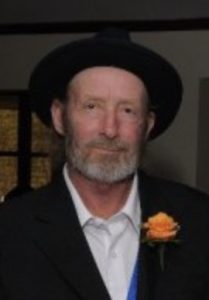Writing Spaces and Building a Sustainable OER
Dr. Joshua Daniel
Welcome to Writing Spaces at Oklahoma State University, our second OER project for FYC at Oklahoma State University, which serves as the primary textbook for English 1213. While English 1113 and its corresponding textbook, Who Teaches Writing, introduced you to a range of genres and styles of writing with an overall focus on writing a lot and writing for different audiences, English 1213 focuses on the various processes involved in researching answers to various inquiry questions and building effective arguments within and outside academic contexts. Our curriculum takes you through the processes of listening/summarizing, asking questions, characterizing scholarly debates, and entering those debates once you have something productive to add to an ongoing conversation.
Who Teaches Writing was produced “in-house,” so to speak. We received a $10,000.00 grant from Dr. Matt Upson and worked with OER guru/knower-and-doer-of-all things Dr. Kathy Essmiller to produce essays about important concepts for beginning writers by paying authors from Oklahoma State and other institutions to write for us. Writing Spaces at Oklahoma State University was produced using a different process. You’re no doubt asking yourself, “Well, gosh! Who Teaching Writing was uh-mazing! Why would they switch it up?” Despite your well-reasoned “if it ain’t broke don’t fix it” logic, we wanted to use another model for this textbook (and spoiler alert, more is coming) to show in every way we could there are many different ways to produce commercial free textbooks for students. So how did we do this one?
Writing Spaces is, as I like to say, the “OG” of all things commercial-free-textbooks for first-year writing. If you don’t believe me, check out the opening lines on their website:
If terms like “book series” and “peer-reviewed essays” or “by teachers for students” or “free” sound reminiscent of Who Teaches Writing, it is because Writing Spaces was and is the inspiration for Who Teaches Writing. Who Teaches Writing was no brain child of ours, but just the end result of us keeping up with good practice from smart people who have been doing this work for many years. I had the good fortune to serve as web editor for Writing Spaces for a time, and I know their work well. While we borrowed their process to create our textbook, this textbook uses existing Writing Spaces articles and organizes them around the English 1213 curriculum, along with abstracts and introductions from our editorial team (you’ll be meeting them in each section) to deliver you another commercial free textbook. Not only is it entirely possible to create free textbooks for FYC students, it has been for a while. This is because, well, Writing Spaces has been at it for a minute; as FYC Director, I do not believe in unnecessary textbook costs, and almost all commercial textbook costs are almost all unnecessary.
The long and short of it is this: I have no real beef with students paying some cost for textbooks. My issue is that I don’t want students paying textbook costs that aren’t absolutely necessary, and I think as program directors we should explore every possible alternative before making a choice to ask students to pay for materials above and beyond all the other costs associated with college. When we do ask them to pay, it should be as small as we can make it, and we should be thoughtful and purposeful about why they are being asked to pay with a clear sense of who benefits. In other words, if students are paying for textbooks, it should help everyone (them, the program, instructors, etc). If you’re producing an OER, maybe you need to ask students to pay 5 or 10 bucks to compensate your authors. Do it. That’s a necessary and good cost, and not prohibitive for students. Maybe you need to create a small printing fee to give a kickback to your bookstore, who is losing money from a contract with the old textbook supplier. Again, no beef. What is the cost? Is it necessary? Is it prohibitive? Who does it help? If you don’t have good answers to those questions, you may have a problem. The last time we used a commercial textbook, we were always told it was only 40 bucks. It usually ended up being closer to 80 in the end, and we saw no benefit from that. No thanks. Do not pass go.
Reflections on My Father: Why Are We Doing This?
I began my job here at Oklahoma State University in the Fall of 2014. My father–unexpectedly, at the age of 56–died that November during Thanksgiving Break. My parents split up when I was 3 and they never saw eye-to-eye on much of anything, but there are two important qualities they share: 1) they were/are (yes, Mom, I know you’re still alive) tremendously intelligent people; and 2) neither of them had the chance to graduate high school. My mom is one of the great storytellers of our generation, so I won’t speak for her here, but I have come to realize in recent years some things about my dad’s story are important to the work I do today, and I want to share them with you here.
In my dad’s case, he didn’t even get the chance to finish middle school and had to drop out during the 7th grade to work full time. From the age of 13 until his death at the age of 56, he worked as an electrician (a good one at that from everything I ever knew or learned about the man). Think about that for a second. My father died young after putting in 43 years of hard labor. My academic career, especially in recent years, has been in many ways shaped by these facts about my father. As part of my work directing the FYC program at OSU, I have worked closely with the Gardner Institute and their Gateways to Completion program. Recently, the Gardner Institute has been launching a new series about transforming the first 60 hours of college courses toward accessibility, and they have stated as their goal to make “race, ethnicity, and family income no longer reliable predictors of who gets to graduate college.” For me, this is a major focus of our OER Project. No matter who you are, or where you come from, or what your family has or does not have, we can provide these FYC textbooks for free. This is a small gesture to remove barriers to education, and we are so happy to be able to do it for all of you.
You find yourself now in a college classroom, reading this, maybe thinking about your own parents and the work/opportunities you have in front of you. If you think college is hard for you or if you ever worry that maybe you aren’t good enough to succeed, know that I thought those things about myself and, if you want to know the truth about it, I still think those things a lot. Know this: you are a student in a first-year writing program that believes in you and believes in your capacity to succeed in college. If the only thing between you and a college degree is your ability and willingness to do the work, we think you have a really great shot at success.
Go get it.
To Dad: Thanks For Everything
See you on the other side.



